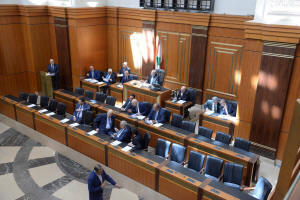|
Lebanon's state institutions are already in a power vacuum, with
the presidency empty since Michel Aoun's term expired in October
2022 and no agreement as to who should replace him.
The government is also operating in a limited caretaker
capacity.
Staggered municipal and council elections had been scheduled for
May but funding has not yet been secured by the state, according
to caretaker Interior Minister Bassam Mawlawi.
Lawmakers approved a "technical extension" until May 31, 2024
for the municipal councils and local officials responsible for
issuing basic civil documents, saying it would at least protect
another state institution from being emptied out.
"Are we supposed to paralyse the state even more?" said lawmaker
Bilal Abdallah after the vote.
Some parliamentarians, including from the Lebanese Forces party
boycotted the vote, saying elections were a right.
Others have disputed parliament's ability to legislate at all,
arguing that the constitution stipulates it should elect a
president before working on laws.
The current 128-member parliament was elected in May 2022 in the
first vote since the country's economy began to unravel in 2019
and a devastating blast hit Beirut port the following year.
Lawmakers have held repeated sessions to elect a new president
in recent months but no candidate was able to secure a majority.
Lebanon's economy has been crippled by the collapse of its
currency, which has lost some 98% of its value against the U.S.
dollar since 2019, triggering triple-digit inflation and
plunging many into poverty.
(Reporting by Maya Gebeily; Editing by Sharon Singleton)
[© 2023 Thomson Reuters. All rights
reserved.] Copyright 2022 Reuters. All rights reserved. This material may not be published,
broadcast, rewritten or redistributed.
Thompson Reuters is solely responsible for this content.

|
|



